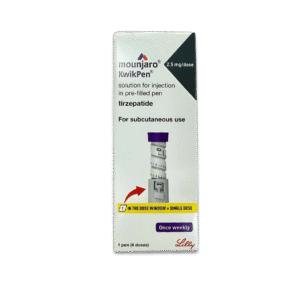Description
Introduction
This is a bundle product that combines two prescription medicines:
- Ozempic® (Semaglutide) – an injection used for blood sugar control in type 2 diabetes and weight management support.
- Duphalac® Syrup (Lactulose) – a gentle osmotic laxative that helps relieve constipation and improve bowel regularity.
Together, this bundle is designed to support patients on Ozempic therapy who may also experience digestive discomfort, by combining effective blood sugar management with gentle bowel regulation.
How to Take
Ozempic®: Administered once weekly via a pre-filled injection pen under the skin (subcutaneous injection) in the thigh, abdomen, or upper arm. Rotate injection sites each week.
Duphalac® Syrup: Taken orally. Can be mixed with water, juice, or milk to improve taste. Best taken at the same time daily.
Dosage
Ozempic®:
- Usual starting dose: 0.25 mg once weekly for 4 weeks.
- May be increased to 0.5 mg weekly. Your doctor may adjust up to 1 mg or 2 mg weekly depending on your treatment plan.
Duphalac® Syrup:
- Adults: 15–30 ml daily.
- Dose may be adjusted based on response and severity of constipation.
Always follow your doctor’s prescription and do not self-adjust doses.
Shelf Life
Ozempic®: Typically 2 years from manufacturing date. Once opened, use within 6 weeks when stored correctly.
Duphalac® Syrup: Usually 3 years unopened. Once opened, check label and use within the recommended period.
How to Store
Ozempic®: Keep refrigerated (2–8°C) before first use. After opening, may be stored at room temperature (below 30°C) or refrigerated. Do not freeze. Protect from light.
Duphalac® Syrup: Store below 25°C. Do not freeze. Keep the bottle tightly closed.
Active Ingredients
- Ozempic®: Semaglutide (GLP-1 receptor agonist).
- Duphalac®: Lactulose (synthetic sugar that works as an osmotic laxative).
Side Effects
Ozempic®:
- Common: Nausea, vomiting, diarrhea, stomach pain, decreased appetite.
- Less common: Pancreatitis, gallstones, low blood sugar (if used with other diabetes medicines).
Duphalac®:
- Common: Bloating, flatulence, stomach cramps.
- Rare: Diarrhea (if overdosed), electrolyte imbalance (with prolonged high-dose use).
Contraindications
Ozempic®: Not for patients with personal/family history of medullary thyroid carcinoma (MTC) or multiple endocrine neoplasia syndrome type 2 (MEN 2). Not recommended during pregnancy or breastfeeding.
Duphalac®: Contraindicated in patients with galactosemia, intestinal obstruction, or suspected perforation.
Drug & Food Interaction
Ozempic®:
- May slow gastric emptying, which can affect absorption of other oral medications.
- Use caution when combined with sulfonylureas or insulin (risk of hypoglycemia).
Duphalac®:
- Avoid with antacids or laxatives that may reduce its effect.
- High doses may affect electrolyte balance if combined with diuretics or corticosteroids.
Quick Tips
- Stay hydrated when taking Duphalac® to improve its effectiveness.
- Take Ozempic® on the same day each week for consistency.
- Eat a balanced diet rich in fiber to support digestive health.
- Do not stop taking these medications without consulting your doctor.
- Report severe or persistent side effects immediately.
FAQs
1. Why are Ozempic and Duphalac bundled together?
Because Ozempic can sometimes cause gastrointestinal side effects like constipation, this bundle includes Duphalac® to provide gentle digestive support.
2. Can I take Duphalac® every day?
Yes, Duphalac® is safe for daily use as prescribed. The dose may be adjusted depending on your bowel movements.
3. Do I need to inject Ozempic® at the same time each week?
Yes, consistency helps maintain stable results. Choose a convenient day and stick to it.
4. Can I take Duphalac® with other medicines?
Yes, but always take Duphalac® at least 2 hours apart from other oral medications to avoid absorption issues.
5. What should I do if I miss a dose of Ozempic®?
If less than 5 days have passed, take the missed dose as soon as possible. If more than 5 days, skip the dose and take the next one on your scheduled day.
![[Bundle 2] Ozempic Gentle Digestive Support (with Duphalac Syrup)](https://www.doctoroncall.com.my/wp-content/uploads/2025/05/Bundle2-Ozempic-Gentle-Digestive-Support.png)




-300x300.jpg)